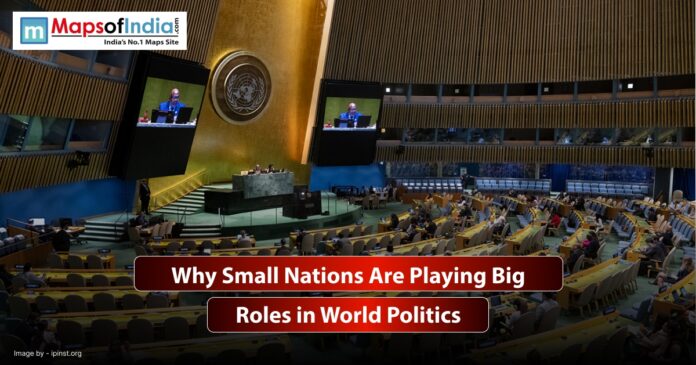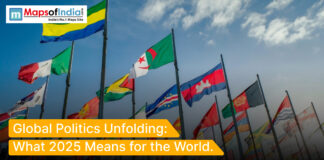Small nations play an important role in shaping the world. They create waves that shake big nations. In recent years, countries with small populations and areas wield outsized influence. Think of countries like Qatar, Singapore, or any country in Europe. They might be small in size and population, but their strategic moves shape global agendas. From diplomacy to tech innovation, they have a bigger influence than their size. Globalisation and interconnectedness have amplified their voices on the global stage. These nations leverage unique strengths.
Strategic Geography Boosts Influence
Having a strategically good location matters for small nations. For example, Qatar sits on vast gas reserves. Qatar’s position in the Persian Gulf makes it a trade hub. Singapore built itself with ports. Singapore controls the Malacca Strait. Over 25% of global trade flows through this way. Iceland work as a bridge between North America and Europe. Its air routes and NATO base are helpful for the USA against Russia. Norway also play an important role geopolitically in the Arctic region. Small nations should use geography smartly and use it to attract wealth to the nation. They broker deals and host summits. Their position gives them leverage. They turn their location into their power.
Diplomacy and Mediation as Power Tools
Small nations are the key to global diplomacy. These nations often act as neutral mediators in a conflict. Qatar brokered U.S.-Taliban talks in 2020. It also hosted Gaza ceasefire discussions in 2024. Switzerland facilitates Iran-Saudi dialogues. Small nations do not have colonial baggage. This earns trust. The Oslo Accords happened in Norway, shaped peace efforts. Ireland pushes human rights at the UN. These countries host many important global forums. The small size of these nations reduces threat perception. They bridge divides between superpowers. Diplomacy makes their voice bigger on the global stage.
Economic Innovation Drives Global Impact
Small nations lead in niche economies. Singapore emerged as a global fintech giant. Its GDP per capita tops $87000 this year. According to a recent World Bank report, it ranks first for business ease. The passport of Singapore ranked 1 worldwide. Estonia is way ahead in e-governance. The digital ID system developed by them inspires many nations. Israel’s tech startups fuel cybersecurity advances. According to a TechCrunch article, which states Israel’s tech export earns $20 billion. Luxembourg dominates green finance and crypto. Small populations foster agility. These nations mostly focused on education and tech. They attract global investment in innovation. Economic strength gives them political clout. They shape markets despite their size.
Soft Power Through Culture and Branding
Small nations wield soft power. They build their nation’s brand worldwide through culture and appropriate branding, which attracts tourists and foreign investment. Iceland’s tourism saw a rise after volcanic eruptions. Its music and marvellous landscapes draw millions of tourists each year. According to a CNN Travel report, more than 2 million tourists visit yearly. Bhutan promotes Gross National Happiness. This philosophy has influenced global wellness trends. These small nations charge more from tourist to preserve their heritage. New Zealand’s Maori culture and film industry shine. The Lord of the Rings boosted tourism here by showing the extraordinary landscape from here. According to the Variety article, New Zealand tourism generated $1 billion in revenue. Qatar’s Al Jazeera is known as one of the well-known news sites worldwide, shaping global narratives. Small nations craft strong identities using their soft power, like media, art, and tourism. This builds influence without military might.
Climate Leadership by Small States
Small nations raise climate issues on the global stage. When the Maldives faced the rising sea levels problem. It pushes for global emissions cuts. According to a recent UN report, highlights its COP advocacy. Tuvalu’s digital nation project combats climate threats. They are preserving culture online. Costa Rica runs on 99% renewable energy. A recent Guardian article praises Costa Rica for its carbon-neutral goal. Small states form alliances like AOSIS. They pressure big nations that are causing pollution. Their vulnerability makes their voices loud. They play an important part in shaping global environmental policies. The small size of this nation doesn’t limit its impact.
Military and Security Contributions
Small nations play an important part in global security. Singapore’s navy patrols look after the key trade routes. It joins combined naval exercises with the U.S. Qatar hosts the U.S.’s Al Udeid Air Base. It plays a critical role in Middle East policies. Iceland, with no army, supports NATO. It’s the sea base Keflavik that monitors Russian subs. Small nations offer bases and intelligence to other nations. They join coalitions if needed against global terrorism. This kind of contribution earns them diplomatic favours. Security roles amplify their global presence.
Challenges of Small Nation Influence
This global influence comes with its own set of risks. Small nations face economic dependence on big economies. Singapore’s economy relies on global trade happening through its route. The position of political neutrality is tricky. It can attract criticism from surrounding nations. Small populations limit resources. Estonia’s e-governance faces cyber threats. Overreliance on soft power can not always be useful. Bhutan struggles with tourism’s environmental cost. Big powers may pressure them as they need. Maintaining autonomy is tougher for small nations. Small nations must balance influence with survival.
The Future of Small Nation Power
In the coming times, small nations will grow bolder. In the coming years, digital diplomacy will expand. According to a recent World Economic Forum report predicts AI-driven foreign policy is predicted. Singapore is now testing blockchain for trade deals. Small states will lead in niche tech. Climate advocacy won’t always show results. There are many challenges that exist for small nations that oppose globally influential nations. But the small nations are agile. These nations adapt faster than superpowers. Their influence will shape trade, peace, and sustainability.
Conclusion
Small nations are global heavyweights in the coming years. In the coming years small nation with economic and location power will have a bigger influence. This nation’s geography, diplomacy, and innovation will make it a big player in the global race.. Small nations can challenge big nations’ influence, but they lack political and economic power. With soft power and climate leadership, they are being influenced on the global stage. There are many challenges, like dependence on big nations for things remaining. Yet their agility shines. From Bhutan’s happiness model to Estonia’s digital ID, small nations are taking bold steps to lead their nation. They prove size doesn’t limit influence. The world listens when they speak. Their role in politics will only grow in the coming years.





